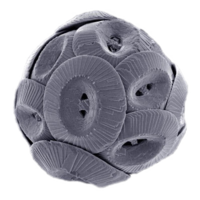Microbiologically induced calcite precipitation

Microbiologically induced calcite precipitation means tiny living things making rocks. There are very tiny living things called bacteria that can do this. These bacteria produce a substance called urease, which breaks down urea in the environment. When you mix the urease and calcium ions together, it creates a reaction that forms calcite. Calcite is a type of rock made from a mineral called calcium carbonate.
So, when these tiny bacteria mix with calcium ions, they create calcite that can cause the formation of rocks. This can be helpful in different ways, such as strengthening soil, preventing erosion, and reducing the amount of groundwater that flows. This process is also known as biomineralization, where living organisms play a significant role in the formation of rocks. This process is exciting because it shows how bacteria can help create something that can last a very long time.
So, when these tiny bacteria mix with calcium ions, they create calcite that can cause the formation of rocks. This can be helpful in different ways, such as strengthening soil, preventing erosion, and reducing the amount of groundwater that flows. This process is also known as biomineralization, where living organisms play a significant role in the formation of rocks. This process is exciting because it shows how bacteria can help create something that can last a very long time.
